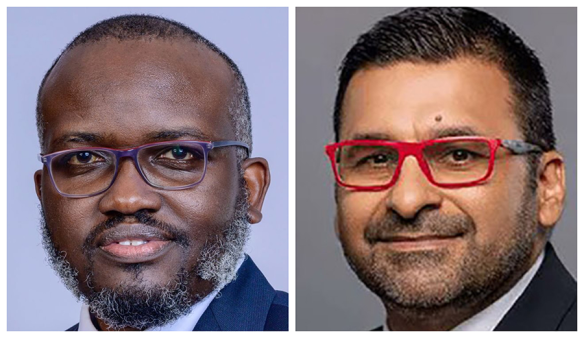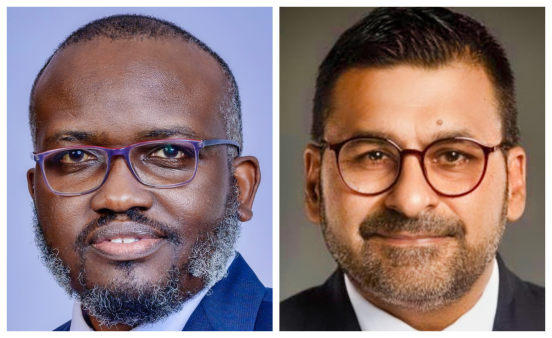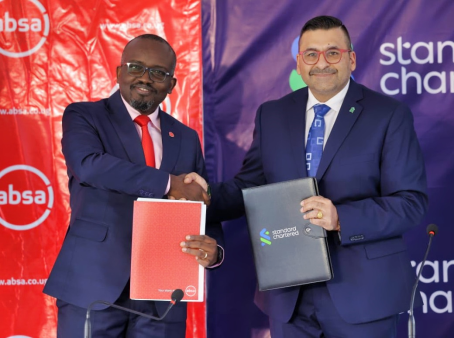For starters, how do you describe yourself?
I have so many ways that I could describe myself. Last year I attended an executive coaching course and the question that I was asked was who am I? It took me to a new depth because the normal way of me telling everyone who I am is, ‘I am the CEO of Standard Chartered Bank, and that is the normal face I wear but having taken time to understand myself, I would say I am a very privileged human being who has had a diverse and dynamic life.
Ethnically you know I am a Tanzanian of Indian Origin. I was born there and was taught a lot of cultural values like respect for others, God being part of my life, family being very important, relationships, friendships, trust, faith and hope. Being born in Africa, these are normal things that you grow up with. Growing up in Africa is not a lifestyle that comes with privilege like in many parts of the world, but the privilege we have is the privilege of togetherness, we embrace opportunities and challenges together and that’s differently exciting.
I have a very nurturing family of my own; my wife is very dynamic and a very significant leader. I have two brilliant kids and they all help me to become a better person.
Regarding my educational background, I have done many things but one thing that shapes me is I am a Chartered Accountant, and when you are a Chartered Accountant you have to embrace the code of practice, which is all about ethics, trust, and also making sure that you are transparent in communicating effectively to your stakeholders.
I have had a very illustrious 23-year career with Standard Chartered Bank, although in total I have worked for about 35 years in 18 different roles and 5 countries. Uganda is my 6th country. Such a dynamic background shapes you to be resilient and open-minded.
What is important to me is that I need to continue to be relevant, and relevance in one role and one country can be different from other countries. The nature of my career has also made me become a lifelong learner. I am sometimes very impatient about growth because my growth means the growth of the organization that I am part of but overall, I am also an impatient African. I think this continent has so much more it could gain if we desired more.
Professionally, I would say, I am a thorough professional leader having embraced quality human values. Our bank has helped me to focus on relationships, long-term value, and impact. That’s why we are Standard Chartered, and we pride ourselves to be called The Bank that is “Here for good.”.
Personally, I am an outgoing and outspoken person who believes in valuing and nurturing relationships. Essentially, my life’s purpose and motive are about serving, impacting and “enabling lives”. I am also a very resilient human being, having been tested time and again. That’s me.
This being your first time working and living in Uganda, and having worked in 5 other geographies, what’s your view about Uganda? Any surprises?
It is not my first time coming to Uganda, because I used to be a Non-Executive Director of Standard Chartered Bank Uganda for about 4 years so I visited the country often in the past, but this is my first time working here full-time.
I have been here for about two and a half months now and I must say, Uganda has been very warm. It is a very caring society. I feel very cared for. I have seen a lot of joyful faces; the people are happy generally. People are respectful, fun and extremely hospitable. I have enjoyed the food here too. There’s a lot of diversity in food and the foods are amazingly tasteful.
Ugandans, like Tanzanians, love colour, tradition, and respect hierarchy. They are a lot like Tanzanians. They are very patient human beings, regardless of what is happening around them. I think Ugandans are a smart society. They also like to work hard, enjoy their lives, party and celebrate.

However, I think the opportunities available are not as many to optimize the human capacity that we see around us at the moment. That is the challenge that I have seen and felt. Many young and hungry-to-succeed youths want to be relevant, want to be part of a meaningful life, and want to contribute to the nation, but the prospects are not as abundant.
The world, including Uganda, is going through a unique volatile phase – we are recovering from the Covid-19 pandemic, facing the consequences of the Ukraine-Russian war, and constantly battling to manage the impact of climate change and erratic weather patterns. We are also going through challenges on the macros especially the increase in inflation, including food inflation which is a material concern for people.
But overall, as a leader, I must say my first days have been very exciting. I have met a lot of exciting people who are very warm, humble and dynamic. Humility is part of the culture and society, so it has been a very nurturing experience so far.
Speaking about the hunger for success amongst the youths who are also the majority population- as a bank that is “Here for good,” have you seen some opportunities where the bank comes in to fill in the missing gaps and help them to unlock the opportunities that abound?
I think Standard Chartered Bank has been a blessing to Uganda and the country has been a blessing to us. We have been a significant positive value and impact driver to the nation for over a century. We recently celebrated 110 years of existence in Uganda. We were the first Commercial Bank in Uganda and have over time ushered into Uganda very many industry firsts and the most unique products. We are also a Bank that has materially enhanced human potential in terms of leadership and diversity for the financial services sector. If you look around, many of the leaders in corporate Uganda are ex-Standard Chartered employees.
We are a Bank that supports its clients achieve their dreams. Our strategy is big on driving commerce and prosperity through our unique diversity. Commerce is the business and prosperity is the real and potential growth of the client. Prosperous means beyond the client, to the people that work for the client, to the nation, and to the community. Through our strong network, strong digital and product capabilities, deep relationships and commitment to driving sustainability we have made a significant difference.
We did a Socio-Economic impact study a few years ago which confirmed that through our value-added impact we contribute to about 3.5% of Uganda’s GDP and support 3.5% of the nation’s workforce. Through our purpose-driven strategy, we are indeed very proud of the impact we generate.
As a bank, we are committed to playing our role in The Uganda Vision 2040, we will continue our bold digital banking and collaborative sustainability initiatives that materially support our National Development Plan. Going forward, with sustainability being a key part of our strategy, we have taken a firm stand also to accelerate our contribution to the net zero agenda by helping our clients reduce their carbon emissions, we believe this is essential for enhancing livelihoods and driving sustainable economic growth.
Over the last couple of years, Standard Chartered Bank has taken a bold move to digital, rolling back some branches. But when you look at the numbers, it appears this is not paying off as the bank has lost its 2nd position and is now in fourth place. Are you going to continue in that direction or are you going to perhaps propose a different strategy? Are you worried that you’re losing your market position?
First of all, when you lose a position, it’s not always exciting, but when you lose a position while you are still fulfilling your mandate, it is a different thing. You know in 2019, we refreshed our strategy into four strategic priorities and three enablers focused on our aim to continue to be the leading international bank in Uganda, which is indeed the case.
So, what will be our key priorities going forward? We continue to remain very confident in our purpose and strategy to drive bigger value for our clients, enhance business growth and deliver our societal ambitions. As indicated before, our Sustainability agenda and related action leadership will remain a key priority as many continue to face significant environmental and climate challenges. Having committed as an organization to reach our net zero carbon emissions from our own operations by 2025, we will use our unique abilities to catalyse finance and partnership solutions to accelerate impact.
Through our stand of lifting participation, we are determined to improve the lives of many people and communities by unleashing the financial potential of women and small businesses. This, we will do more through strategic partnerships and technology. You are aware we have significantly advanced and become bolder on our digital agenda, because, let’s face it, the changing consumer behaviours in our population require us to go that way. Fewer and fewer customers want to come to the branches anymore. Everybody wants to bank conveniently and with agility so technology is a key enabler here. Your comment reconfirms that as a Bank, we have in several instances been ahead of time in digitizing the industry. Take for instance our state-of-the-art flagship Standard Chartered Mobile App which is a Bank in the hands of our clients and has transformed the way banking is done, in the longer term that is what everybody is going to want, and competition is now trying to catch up.
Since we restructured our branch distribution, our client base has materially grown and during Covid-19, our clients could reap the benefit of digital banking as they couldn’t come to our branches for almost two years. So, going forward, I would say that our customers can count on us to continue to be more innovative and support them with more value in their banking needs.

Lastly, we will deliver through our STANDS, we are also committed to Resetting Globalization by helping companies to improve working and environmental standards and give everyone the chance to participate in the world economy, so growth becomes fairer and more balanced. You will appreciate that as a leading trade bank, we can connect the capital, expertise and ideas needed to drive new standards and create innovative solutions for more equitable and sustainable growth.
Every time there is a change of leadership everybody out there has a lot of expectations. To your stakeholders – staff, customers and other stakeholders. What kind of message would you like to send to them?
For staff, I think most of my staff believe that they are already working for the best organization in the country, so my role is to continue making sure that is a much bigger reality and that they continue to be very proud of the bank and what we stand for.
To our other stakeholders, I assure them of our collaboration so that together we can create enhanced long-term and sustainable value for Uganda and the people of the nation. The financial services sector has many opportunities and risks, we will continue to be meaningfully engaged to support the effective functioning of the industry and the broader economy.
To our suppliers, especially, I would like to tell them that we are here to win together, so my commitment is we win together because it’s not going to be a one-sided affair. We have to value each other, and we create value for each other.
To my peers, the members of the Uganda Bankers Association, I would like to, first of all, commend them for creating and sustaining a robust association. I have already met a lot of my peers and they are amazing leaders in the market. They should expect respect from me. They should also expect that we will grow together. This country is going through exciting and challenging times. It is in challenging times that we have to expand our leadership strengths to the nation. My peers in the industry and other CEOs elsewhere should count on me to be a force for good.
The bank industry is in a vantage position when it comes to detecting the pulse of the economy. From where you sit what do you make of the economy, especially given where we are coming from and then the impact of the Russian-Ukrainian war?
I would say we are going through a perfect storm. The world, Uganda inclusive, is going through turbulent times. Inflation is rising, exchange rates are becoming volatile, interest rates are rising, supply chains are constrained and the pandemic is not out completely. We then have some leadership challenges in some countries and then there is the Russian-Ukrainian war. Energy prices are also going up and we are not immune to that. As a nation, we have to continue to ensure economic resilience and sustainability.

But there are lessons in this. I do not foresee a world that is going to be stable completely, we will continue to witness ongoing volatility. There is no perfect world. So as a country, as a people, we need to enhance collaboration and look at how to maximize our competitive advantages. If I look at Uganda I think we are uniquely positioned in some things such as agriculture, so we should be investing in becoming the real food basket of the world – that is of course after becoming self-resilient. There is a huge opportunity here to become net exporters of food.
Secondly, we need to capitalise on the peace and focus on the opportunities here because let’s face it, peace is not a given. Many countries are in a different state.
I think oil and gas will bring in more opportunities for us, so we need to collaborate to maximize the national potential and benefits. Uganda is in a good space if we take better decisions because there are global strong headwinds to which we are not immune. Taking advantage of our unique national fundamentals and through deliberate growth strategies, we should expand our ambitions to elevate our economic growth.
As a person, what would you say is your leadership style? What is your leadership philosophy? What keeps you grounded?
Leading people is an extremely responsible role, especially where you are leading some of the best talents in the country for one of the best banks. It is a role I see as a privilege on one part and one that I hold with a lot of humility. I am reminded daily that my role here is not only to take care of the bank but more importantly to care for my colleagues, our many clients plus stakeholders, and the needs of the nation and in turn, they will all collaborate to take care of the bank.
So my philosophy is really about being responsible, humble, and realistic while being constantly aware of the changing dynamics and playing to them. That keeps me grounded, and I like to learn and nurture.
As the CEO I like to call myself the Chief Enabling Officer. I don’t call myself a Chief Executive officer because am constantly making sure that I am enabling the lives of my team, clients, and peers, because the more I do that, the more we see prosperity and impact, which is very important.
In terms of my leadership style, I believe it is dynamic. I appreciate we are not in a static world and need to constantly grow and evolve, for me, it’s ensuring ongoing organizational flexibility and agility, developing relationships and ensuring quality focus on performance, impact and delivering value.
 Letters to My Younger Self: Humphrey Asiimwe—"Ambition Without Purpose Leads Nowhere"
Letters to My Younger Self: Humphrey Asiimwe—"Ambition Without Purpose Leads Nowhere"


